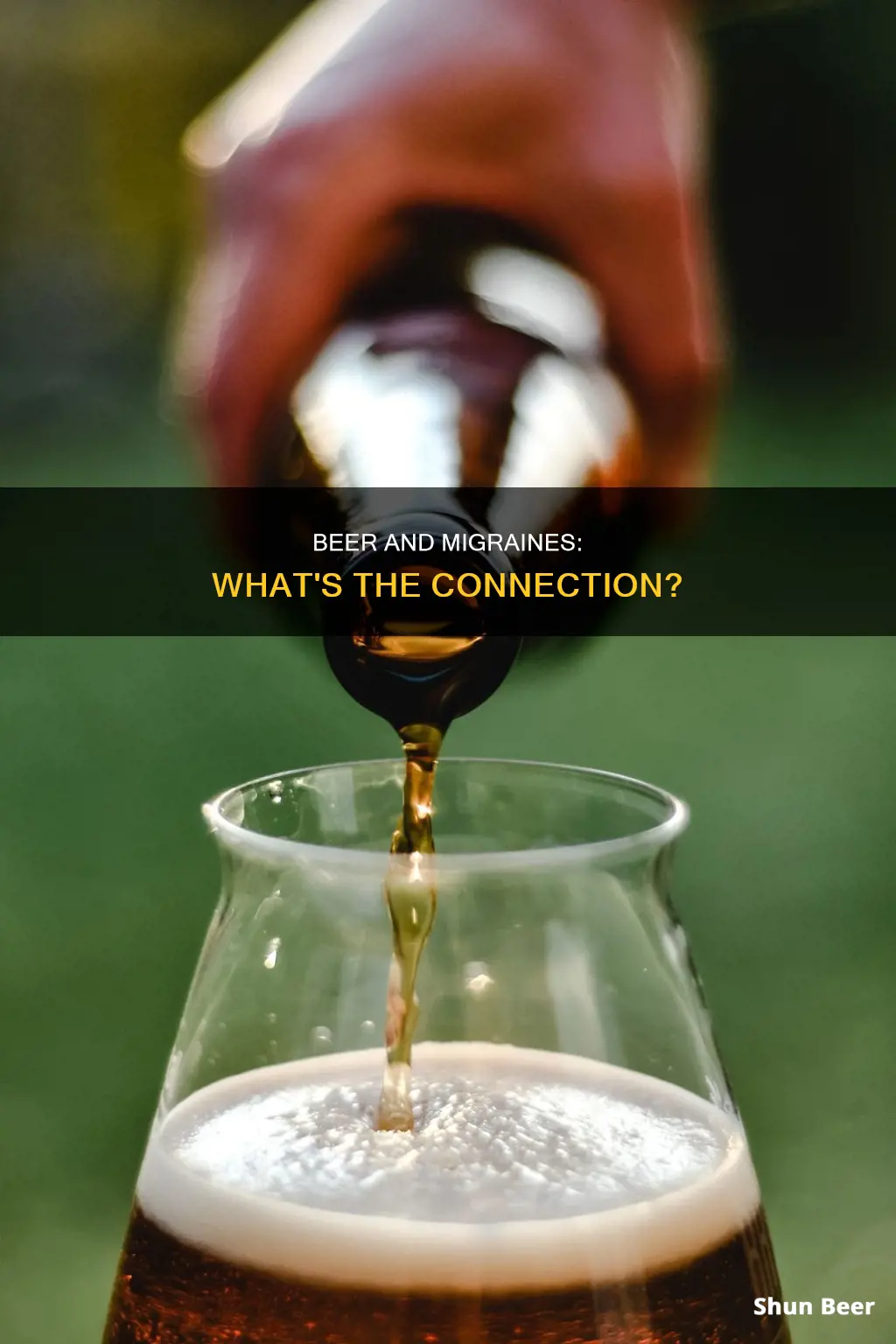
Alcohol is a common trigger for migraine attacks, with around a third of migraine sufferers saying that alcohol can trigger their attacks, and about 10% saying it triggers them regularly. However, the exact cause of why alcohol triggers migraines is not fully understood, and it could be different for different people. Alcohol contains ethanol, which is broken down by the body into a chemical that triggers migraines, and it also spurs the production of histamine, which increases inflammation throughout the body. Additionally, alcohol is a diuretic, which can lead to dehydration, another common migraine trigger.
Beer contains tyramine, a compound produced from the breakdown of the amino acid tyrosine, and histamine, both of which are potential migraine triggers. Beer is also a diuretic, which can lead to dehydration. However, the relationship between alcohol and migraines is highly individualised, and there is some debate about whether it is the alcohol itself or another chemical component in alcoholic drinks that acts as the trigger.
A 2018 study of almost 2,200 migraine patients found that 35.6% reported alcohol as a trigger, with red wine being the most common trigger among alcoholic beverages. Beer ranked fourth, after white wine and champagne/sparkling wine. Interestingly, a 2023 prospective cohort study suggested that alcohol may be less important as a trigger factor than previously assumed, with researchers finding no effect of alcohol consumption on the probability of a migraine attack one day after consumption.
| Characteristics | Values |
|---|---|
| Alcohol as a migraine trigger | About a third of people with migraines find that alcohol can trigger attacks, while about 10% find it triggers them on a regular basis. |
| Alcohol-induced migraine attacks | Can come on within minutes to hours of drinking. Even small amounts of alcohol can trigger an attack. |
| Alcohol-induced migraine cause | It is unclear what exactly it is about alcoholic drinks that triggers migraines, and the root cause may differ between people. |
| Alcoholic drinks | Contain compounds besides alcohol itself that may trigger migraine attacks. These are byproducts of alcohol fermentation, known as congeners, and are found in higher quantities in darker drinks. |
| Alcohol and blood vessels | Alcohol causes blood vessels to expand and increases blood flow, which could contribute to migraine attacks. |
| Alcohol and migraines | If alcohol is a trigger for your migraines, it may be best to avoid it. If you are unsure, keep a detailed migraine journal. |
| Alcohol and hydration | Alcohol is a diuretic, which causes the body to remove fluids more quickly than usual through urine. This can lead to dehydration, which is a migraine trigger. |
| Beer and migraines | Beer ranked fourth in a list of drinks most likely to trigger migraines, after red wine, white wine, and champagne/sparkling wine. |
| Beer ingredients | Beer's ingredients, such as tyramine, histamine, or tannins, may trigger migraines in some people. |
What You'll Learn

Alcohol's role in triggering migraines
Alcohol is a trigger for migraine attacks in about a third of people living with migraines. However, the exact role of alcohol in triggering migraines is not yet fully understood. It is also not clear whether it is the alcohol itself or another chemical component in alcoholic drinks that acts as the trigger.
Alcohol byproducts
Alcohol byproducts called congeners have been linked to headaches. Congeners are formed during the fermentation process and are found in higher quantities in darker drinks such as red wine, brandy, whiskey, and beer.
Histamine
Alcohol contains histamine, a compound that has been linked to vascular headaches. Alcohol also stimulates the body's immune system to produce more histamine, which increases inflammation throughout the body.
Ethanol
Ethanol is the main ingredient in alcohol and is converted by the body into a chemical that can trigger migraines. Ethanol is also a diuretic, which can lead to dehydration, another common migraine trigger.
Blood vessel expansion
Alcohol causes blood vessels to expand and increases blood flow, which could contribute to migraine attacks. However, research suggests that changes in blood vessels are not the direct cause of migraine attacks.
Individual factors
The relationship between alcohol and migraines is highly individualized, and other factors such as body weight, ethnicity, and genetic predisposition may influence the likelihood of alcohol triggering a migraine.
Treatment and prevention
If alcohol is a trigger for migraine attacks, the best solution is to avoid it altogether. However, if you are unsure, keeping a detailed migraine diary can help identify patterns and specific triggers. Drinking in moderation, staying hydrated, and controlling other triggers such as stress and lack of sleep can also help reduce the risk of alcohol-induced migraines.
Morning Beer: Should You Drink Before Work?
You may want to see also

Alcohol-induced migraines vs. hangovers
Alcohol-induced migraines and hangovers are two different things. However, people with migraines are more susceptible to hangovers.
Alcohol-induced Migraines
Alcohol can trigger a migraine attack within 30 minutes to three hours of consumption. This is the typical alcohol-induced migraine. Migraines can also be triggered by the chemicals that alcohol is broken down into by the body, or its diuretic effect, which can lead to dehydration. Alcohol also contains a chemical called histamine, which spurs the immune system to produce more, increasing inflammation throughout the body.
Delayed Alcohol-Induced Headache (DAIH)
Also known as a hangover, this type of headache typically happens the morning after drinking. It can happen to anyone, but people with migraines are more likely to get one.
Reducing the Risk of Alcohol-Induced Migraines
If alcohol is a trigger for you, it is best to avoid it altogether. If you are unsure, keep a detailed migraine journal that includes any foods and alcohol consumed throughout the week. This will help you and your doctor identify specific triggers. If you are consuming alcohol, drink in moderation, and try to have a glass of water or another non-alcoholic drink in between alcoholic drinks.
Sikhism and Alcohol: Beer Consumption in the Religion
You may want to see also

How to reduce the risk of a migraine attack from drinking
If you are prone to migraines, it is important to be cautious when consuming alcohol, as it is a common trigger for migraine attacks. Here are some strategies to reduce the risk of a migraine attack from drinking:
- Drink in moderation: Stick to small quantities of alcohol to prevent excessive dehydration and give your body a better chance of mitigating triggers. The recommended limits are two drinks or fewer in a day for men and one drink or fewer in a day for women.
- Stay hydrated: Alcoholic beverages dehydrate your body, so be sure to drink plenty of water before, during, and after drinking alcohol. Aim for one glass of water per drink.
- Choose your drinks wisely: Opt for lighter-coloured drinks such as vodka, lager, or light beer, as they tend to have lower levels of congeners, which are byproducts of alcohol fermentation and potential migraine triggers. Avoid drinks with added colours, such as green beer, as they may contain dyes that can trigger migraines.
- Know your triggers: Keep a migraine diary to track your symptoms, the types and amounts of alcohol consumed, and other potential triggers such as food, sleep patterns, stress levels, and menstrual cycle. This will help you identify patterns and determine which drinks or drinking situations you should avoid.
- Control other triggers: Avoid drinking when you are stressed, sleep-deprived, hungry, or menstruating, as these factors can increase your susceptibility to migraine attacks.
- Drink with a meal: Consuming alcohol with a meal may lower the chances of triggering a migraine attack.
- Avoid hangover remedies: There is no evidence that popular hangover remedies, such as drinking raw eggs or downing hot sauce, will alleviate a migraine.
- Try triptans: Consult your doctor about triptans, a type of medication that can help stop a migraine after it starts. However, note that triptans carry serious health risks for some individuals.
- Consider abstinence: If alcohol consistently triggers your migraine attacks, you may need to avoid it altogether.
The Appeal of Non-Alcoholic Beer: Why Do People Drink It?
You may want to see also

The relationship between alcohol and migraines
Alcohol is a common trigger for migraine attacks, with around a third of migraine sufferers reporting alcohol as a trigger. However, the exact cause of alcohol-induced migraine attacks is not yet fully understood. It could be the alcohol itself, or another chemical component in alcoholic drinks.
Alcohol can trigger a migraine attack within 30 minutes to three hours of consumption. Even small amounts of alcohol can trigger an attack. The type of alcohol consumed may also be a factor, with red wine, white wine, champagne, and beer ranking as the most common triggers among alcoholic beverages. Vodka was found to be the least likely to trigger a migraine.
The chemicals that alcohol is broken down into by the body may directly trigger migraines. Alcohol is a diuretic, which can lead to dehydration, another common migraine trigger. Alcohol also contains a chemical called histamine, which increases inflammation throughout the body and can trigger migraines.
Another possible cause is congeners, which are byproducts of alcohol fermentation. Congeners are found in higher amounts in darker drinks, which could explain why some people find they cannot drink dark beers or red wine. However, more research is needed to confirm this.
How to reduce the risk of alcohol-induced migraines
If alcohol is a trigger for you, the best solution is to avoid it altogether. If you are unsure, keeping a migraine diary can help you identify patterns and determine whether alcohol is a trigger for your migraines. If you choose to drink, drinking in moderation, staying hydrated, and controlling other triggers such as stress and lack of sleep can help reduce the risk of a migraine attack.
Beer Olympics: Competitive Drinking Games Explained
You may want to see also

Why do some people get migraines after drinking beer?
Drinking beer can trigger migraine attacks for some people. However, the exact cause of why this happens is not fully understood. It is believed that a combination of factors is at play, and these vary from person to person.
Alcohol and Migraines
Research shows that about a third of people with migraines find that alcohol can trigger attacks, and around 10% experience this regularly. Alcohol-induced migraine attacks can occur very quickly, within minutes to hours, and even small amounts of alcohol can be a trigger.
The Role of Alcohol
The role of alcohol in triggering migraines is not entirely clear. Alcohol contains ethanol, which is converted into a chemical that triggers migraines. Ethanol is also a diuretic, which increases urination and can lead to dehydration, a common migraine trigger.
Congeners and Other Compounds
Alcoholic drinks also contain congeners, which are byproducts of alcohol fermentation. Congeners are found in higher amounts in darker drinks, such as red wine, brandy, and whiskey, and are thought to trigger headaches. Alcohol also contains histamine, which increases inflammation in the body, and spurs the immune system to produce more.
Blood Vessels and Blood Flow
Alcohol causes blood vessels to expand and increases blood flow, which could contribute to migraine attacks. However, research suggests that changes in blood vessels are not the primary cause of migraine attacks. Migraines are now understood to be a brain disease, rather than a disease of the blood vessels.
Individual Factors
The relationship between alcohol and migraines is highly individualized, and other factors can influence the occurrence of migraine attacks. For example, stress, lack of sleep, skipping meals, and menstruation can all be triggers. Additionally, the specific type of beer or alcoholic drink may also play a role, with some people finding that certain brands or types of beer are more likely to trigger a migraine attack.
Preventing and Treating Migraines
To prevent migraines triggered by alcohol, it is recommended to drink in moderation, stay hydrated, and control other triggers. If a migraine occurs after drinking, it is important to stop drinking, hydrate, and rest. Over-the-counter pain medications should be avoided, as they can irritate the stomach lining and increase stress on the liver.
Identifying Triggers
To identify whether beer or specific types of alcohol are migraine triggers, it is helpful to keep a migraine diary. Recording the number of drinks, the type of alcohol, and other potential triggers can help identify patterns and determine which drinks are more likely to cause a migraine attack.
Nursing and Non-Alcoholic Beer: What's Safe?
You may want to see also
Frequently asked questions
Beer is a common trigger for migraines, but it varies from person to person. Some people can drink beer with no issues, while for others, it's a guaranteed trigger.
The exact cause of alcohol-induced migraines is not fully understood. It could be the alcohol itself, or other compounds in beer such as histamines, tyramine, or tannins. Beer is also a diuretic, which can lead to dehydration, another common migraine trigger.
Migraines can occur within 30 minutes to 3 hours of drinking beer.
If beer is a trigger for you, it's best to avoid it altogether. If you're unsure, try drinking in moderation, staying hydrated, and controlling other triggers such as stress and lack of sleep.
If you feel a migraine coming on, stop drinking, hydrate, and take your usual rescue medication if needed.







